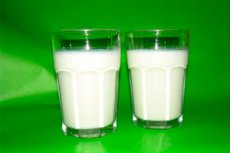Medical expert of the article
New publications
Milk for diabetes
Last reviewed: 03.07.2025

All iLive content is medically reviewed or fact checked to ensure as much factual accuracy as possible.
We have strict sourcing guidelines and only link to reputable media sites, academic research institutions and, whenever possible, medically peer reviewed studies. Note that the numbers in parentheses ([1], [2], etc.) are clickable links to these studies.
If you feel that any of our content is inaccurate, out-of-date, or otherwise questionable, please select it and press Ctrl + Enter.

Nature has provided food for all creatures born in the form of mother's milk. This nutrient contains everything necessary for the growth and development of the baby. With the development of civilization, animal milk, especially cow's milk, has become a full-fledged food product, produced on an industrial scale. It contains many useful ingredients - proteins, vitamins, more than 50 minerals, the most valuable of which is calcium. Its role is not limited to the building function for bones and teeth, but the work of the heart, blood pressure, the state of the nervous system depend on it, it reduces the level of "bad" cholesterol. To provide a daily dose of minerals, children and adults need to include milk and dairy products in their diet. Is milk acceptable for diabetes?
Is it possible to drink dairy products and milk if you have type 1 and type 2 diabetes?
Can you drink dairy products and milk if you have diabetes type 1 and 2? Diabetics need calcium, so the answer is clear - yes, but with the caveat that their fat content should not be high. Low-fat milk, cottage cheese, yogurt, kefir, and other fermented milk products are included in the list of permitted products for diabetics, and gestational diabetes is no exception. During pregnancy, a woman, like no one else, needs calcium, phosphorus, selenium, zinc, iodine, and more, since the foundation of a future new life is being laid.
There is another opinion that cow's milk can cause diabetes. There are studies that show that some patients had a connection between the onset of the disease and milk consumption. However, there are no official recommendations on this matter, although experts warn against replacing mother's milk with animal milk if it is not necessary.
Benefits
How is milk useful for diabetes? First of all, it is a source of calcium, magnesium, phosphorus, vitamins, microelements, lactose - everything that the body needs for proper functioning. The factor that speaks against it is fat content. Therefore, low-fat dairy products, preferably fermented milk, will be beneficial. They are easily digested, lactose improves the functioning of the liver and kidneys, removing toxins and waste. This opinion belongs to the fans of the theory of the usefulness of milk for diabetes. Let us give more detailed characteristics of different types of milk and other dairy products and their effect on the body in diabetes:
- mare's milk - differs in composition from cow's milk, it has less fat and protein, but more lactose. It is well absorbed and has a high biological value. In composition and quantity of proteins it is close to female, and the percentage of polyunsaturated fatty acids in it is even higher. In the presence of ascorbic acid, it surpasses all other types, it has many B vitamins, vitamin D, E. It has everything to improve immunity, prevent the appearance of sclerotic plaques, balance the nervous system - properties suitable for diabetes; baked milk - obtained by boiling and long simmering at a lower temperature of ordinary milk. Its readiness is determined by the change in color from white to cream, a decrease in volume, the formation of a film. The resulting product contains less water, the concentration of other substances increases, only vitamin C is destroyed, it becomes much less. Baked milk is better absorbed, its calorie content is low, this makes it preferable for diabetics than whole milk;
- goat's milk - it has always been revered as a remedy for many diseases due to the fact that it contains about 40 components useful for the body: vitamins B1, B2, B6, B12, C, E, A, D, enzymes, amino acids, antioxidants, magnesium, iron, manganese, potassium, sodium, calcium, etc. In composition, it is very close to breast milk. With its help, metabolic processes are restored, thyroid function, the immune and cardiovascular systems are strengthened, hematopoiesis and blood circulation are improved. Lysozyme in its composition provides antibacterial and healing effects. Despite the high fat content, diabetics are recommended to drink goat's milk, while observing some rules: drink small portions at intervals of 3 hours, balance the caloric content of food due to other products;
- cottage cheese for diabetes - nutritionists believe that this is an ideal product for diabetes. It belongs to fermented milk products, it contains many useful elements that are well perceived by the digestive tract, are easily absorbed, replenishing protein reserves, strengthening the immune system, bone tissue, normalizing blood pressure. Considering that its insulin index is quite high and stimulates a powerful release of insulin, a low-fat product is recommended in a small portion and no more than once a day;
- kefir - breaks down glucose and milk sugar in the body, includes a whole set of probiotics. It is recommended to drink it in the first half of the day, preferably after breakfast in a volume of half a liter to a liter;
- Milk porridge is a source of slow carbohydrates, i.e. those whose energy is released gradually and does not lead to a sharp jump in glucose. Such food should prevail in patients with diabetes. The following cereals are suitable for cooking porridge: buckwheat, oatmeal, pearl barley, rice from long-grain varieties. Each of them contains its own useful components. Thus, buckwheat contains a lot of iron, oatmeal strengthens blood vessels and cleanses the blood of harmful cholesterol, the last two contain phosphorus, accelerate metabolic processes. When cooking them, there should be twice as much milk as cereals, sugar is excluded. After boiling, it is best to leave it on low heat to simmer until the grains are boiled;
- coffee with milk - the attitude of specialists towards coffee for diabetes is ambiguous: some consider it a healthy drink, others emphasize its negative impact on the body. It turns out that it combines both. The advantages include the presence of many organic substances: calcium, phosphorus, calcium, vitamin P, plant alkaloids, pectins. Caffeine is on the opposite side of the scale - it invigorates, its effect lasts up to 8 hours, sleep disturbances, increased heart rate, the emergence of a feeling of anxiety and anxiety, excessive production of hydrochloric acid are possible. Low-fat milk levels out such manifestations. This gives lovers of this drink even with such an endocrine disease the opportunity not to deny themselves the pleasure, but not to abuse it;
- dry milk - obtained from regular milk through condensation and subsequent evaporation. High temperature exposure to the product (up to 180 0 C) does not leave it a chance to retain all its healing properties, but still many valuable components are present in reconstituted milk: amino acids, proteins, some vitamins, minerals. It is easily digestible, strengthens the heart muscle, improves vision, so it is suitable for diabetics;
- tea with milk - tea is not only possible to drink with diabetes, but also necessary. It contains polyphenols - natural antioxidants that can maintain insulin levels, protect blood vessels from atherosclerosis, strengthen the heart muscle, prevent the formation of cancer cells, and resist viruses. For diabetics, the most useful types of tea are black, green, and hibiscus. But adding milk to it is not recommended, because this reduces the quality characteristics of the drink, sugar should also not be present in it;
- coconut milk - in the unripe fruit of the coconut there is a liquid called milk, which when ripened turns into copra - white pulp. Due to the rich composition of nutrients, the drink is very healthy, quenches thirst well, has a beneficial effect on brain function, helps get rid of depression and loss of strength, has antiviral properties. But all this is not for diabetics, a large amount of fatty acids makes its use prohibited;
- sour milk or yogurt - is not inferior to fresh milk in its characteristics, but at the same time it is easier for the body to digest. Lactic acid in its composition improves intestinal microflora and stomach function, increases the body's resistance to pathogenic bacteria. Sour mare's milk - kumiss is considered a drink of longevity. It truly has the most valuable properties for the body, but also contains a certain percentage of alcohol, which is harmful for diabetics. But in this case, you should not completely refuse it, because it is low-calorie, does not accumulate as fat, improves blood and lymph circulation, makes the body more resilient to various infectious diseases. You should choose weak kumiss, which contains only 1% alcohol;
- chicory with milk - chicory is a plant useful for digestion, with the help of pectin contained in it, metabolism improves, toxins and slags are removed. But most of all, it is inulin that makes it attractive to diabetics. A quarter of a gram of this polysaccharide replaces a gram of fat. It is used in dietary products, dietary supplements, and baby food. Although it does not replace insulin, it helps to reduce sugar, prevents the development of complications of the disease. Chicory without milk is not a very tasty drink, so adding low-fat milk will improve its taste and will not affect the value of the plant.

Contraindications
Milk and other dairy products are contraindicated in case of individual intolerance, lactose deficiency. Diabetes mellitus excludes the consumption of fatty types. Sour milk is not recommended for ulcers, gastritis with high acidity, cholelithiasis. Kumiss increases the load on the kidneys, so it is necessary to exercise moderation in doses.
Possible risks
Complications such as bloating, flatulence, and even diarrhea with unpleasant abdominal pain symptoms may occur. Skeptics of the benefits of milk for diabetics are quite determined. They claim that milk can even provoke the development of diabetes and should be limited already in childhood. There are no official recommendations or prohibitions from medical officials on this matter, so for the average person these are just assumptions.
Reviews
In the reviews of many people suffering from diabetes, there is evidence that they include milk and other dairy products in their diet. In most cases, preference is given to kefir, it is easier to digest and does not cause any unpleasant consequences. When counting bread units, their content in dairy products is taken into account and is regulated by other food.


 [
[